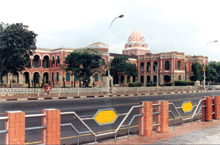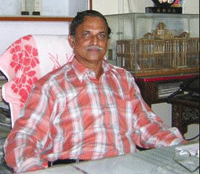Despite being subject to rigorous affirmative action quotas, this state government funded arts, science and commerce college has maintained its reputation for academic excellence
 Strategically sited on Chennai’s popular Marina beach on a sprawling 30-acre campus, is the gothic red and white stone Presidency College (estb: 1840), one of India’s pioneer institutions of higher education. The first government college to be established in Tamil Nadu (pop: 62.1 million), the 168-year-old Presidency College was the precursor of the University of Madras (estb: 1857).
Strategically sited on Chennai’s popular Marina beach on a sprawling 30-acre campus, is the gothic red and white stone Presidency College (estb: 1840), one of India’s pioneer institutions of higher education. The first government college to be established in Tamil Nadu (pop: 62.1 million), the 168-year-old Presidency College was the precursor of the University of Madras (estb: 1857).
Since then Presidency has steadily established an academic tradition to position itself among the most reputed and prestigious liberal arts and science colleges in the subcontinent. The college boasts a string of illustrious alumni including Nobel laureates Sir C.V. Raman and Dr. S. Chandrasekar, Dr. Srinivasa Varadhan (Able prize laureate for mathematics in 2007), Field Marshal Major General Cariappa (first chief of staff of the Indian Army), V.K. Krishna Menon (former Union minister and diplomat), Bharat Ratna C. Subramaniam (an architect of India’s green revolution of the 1970s) and Union minister of finance P. Chidambaram, among others. Distinguished scholars including former president of India Dr. S. Radhakrishnan and Mahamahopadhyaya Dr. U.V. Swaminatha Iyer have served as Presidency’s faculty.
The history of the college dates back to the early 19th century when its founder Lord Mount Stuart Elphinstone proposed a central collegiate institution or university under the name ‘The High School of Madras University’, comprising a high school and a college located in Egmore. In 1853, the institution entered the second epoch in its history when it established a primary school, rearranged its secondary school classes and separated its collegiate (Plus Two) department. In 1855, the collegiate department was transferred to a newly created department of public instruction and the institution received its present name of Presidency College with Prof. Eyre Burton Powell as its first principal.
The third milestone in the institution’s history was crossed in 1857 when the University of Madras was chartered. The elementary and high school classes of Presidency College were shut down and the college was affiliated with the newly chartered Madras University. In 1870, Presidency College shifted to its present premises on Marina beach.
Today, this arts, science and commerce college wholly funded by the state government (annual budget: Rs. 21 crore), offers free education (tuition fees have been completely waived from the academic year 2007-08) to 4,000 students, mostly from underprivileged and backward classes/castes (for whom 69 percent of annual admissions are reserved) backgrounds, mentored by 244 highly qualified faculty including 133 Ph Ds. Currently the college, which was conferred autonomous status by the Delhi-based University Grants Commission in 1987, offers 18 undergraduate and 20 postgrad study programmes through 24 departments, most of which offer research facilities. Every year 60 students are awarded Ph Ds and 150 earn M.Phil degrees.
 “Our objective is to provide the best education to economically and socially underprivileged students and mould them into good citizens by inculcating a sense of responsibility to society and the country in them. The emphasis is on all-round personality development and we encourage intellectual development coupled with vibrant extra-curricular activity. We also encourage quality research among our students and teachers and produce more research scholars than the University of Madras,” says Dr. S. Ramanathan, an alumnus of Madras University and IIT Madras and incumbent principal of Presidency College.
“Our objective is to provide the best education to economically and socially underprivileged students and mould them into good citizens by inculcating a sense of responsibility to society and the country in them. The emphasis is on all-round personality development and we encourage intellectual development coupled with vibrant extra-curricular activity. We also encourage quality research among our students and teachers and produce more research scholars than the University of Madras,” says Dr. S. Ramanathan, an alumnus of Madras University and IIT Madras and incumbent principal of Presidency College.
Surprisingly, despite stringent state government regulation of admissions in favour of socio-economically backward classes/castes and abolition of tuition fees, the college has been able to maintain academic standards, contradicting the popular belief that affirmative action invariably dilutes learning outcomes.
The National Assessment and Accreditation Council awarded the college four stars in April 1999 and reaccredited it with an A (below A+ and A++) rating in March 2005. Moreover, the Delhi-based newsweekly India Today ranked Presidency as India’s No.1 science college in 2001 and No.1 arts college in 2002, besides consis-tently ranking it among the country’s top ten arts and science colleges during the past seven years.
Although the main administrative heritage building of the college is in obvious need of a face lift, for which the state government has sanctioned a sum of Rs.3.23 crore, the college offers its students enviable infrastructure. Presidency is the only government college in the state to boast a new state-of-the-art bio-informatics centre inaugurated March last year (2007) with a grant of Rs.20 lakh from the central department of biotechnology, Union ministry of science and technology. Moreover, the college is connected via EDUSAT and is equipped with 35 science laboratories, two computer labs with over 50 computers in each, a digital library with 10 terminals, and a general library stocked with 165,000 volumes and 109 journals.
Separate hostels for men and women accommodate around 500 students. The college also has an athletics association which provides sports facilities for table tennis, badminton, volley ball, football, hockey, basket ball, cricket and athletics. Moreover Presidency students have distinguished themselves in Kabaddi and handball, winning several state-level tournaments.
Unsurprisingly over the past century this ancient institution’s reputation has spread countrywide. Consequently, the college receives over 12,000 applications annually for its 785 seats. Somewhat unusually for a government arts, science and commerce college, Presidency has been running a campus recruitment programme for graduates. Last year, of the 726 students who graduated, 134 were placed in blue chip companies including State Bank of India, Tata Indicom, Google Online, Allsec Technologies and Lapiz Digital Services among others.
In acknowledgement of Presidency College’s academic pre-eminence the state government has resolved to elevate the college’s departments of mathematical, physical and social sciences into centres of excellence. “We have also sent a proposal to the state government to grant us the status of a Unitary University and are confident of getting approval. Our future plan is to set higher standards of excellence in academics and bring e-governance into administration,” says Ramanathan.
|
Admission and fees
The eligibility criterion for admission into undergraduate courses is a Plus Two certificate. Application forms are available in the college office and admission deadline dates will be notified on the college notice board. Presidency offers 18 undergraduate and 20 postgraduate courses.
Undergraduate. History, political science, economics, corporate secretaryship, English Lit. Tamil Lit., Hindi Lit., Malayalam Lit., Urdu Lit, maths, statistics, physics, chemistry, botany, zoology, geology, geography, psychology.
Postgraduate. History, political science, public administration, economics, commerce, English Lit., Tamil Lit., Sanskrit Lit., Telugu Lit., maths, statistics, physics, chemistry, botany, zoology, geology, geography, psychology.
Fees. Tuition fee has been waived from the academic year 2007-08 for undergraduate students but candidates have to pay special fees ranging between Rs.20-1,000 per year.
For further information contact The Principal, Presidency College, Kamarajar Salai, Chennai 600005, Tamil Nadu. Tel: 044 28544894; e:mail: info@presidencychennai.com
|
Hemalatha Raghupathi (Chennai)